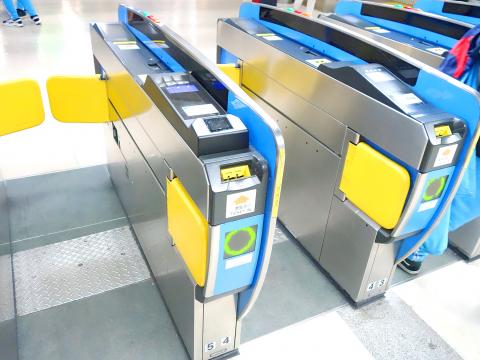People who pass through ticketing gates using a Taiwan Railways Administration (TRA) QR code would not able to reuse them at a the same station once a strict scanning policy is implemented, the railway agency said yesterday.
The new ticketing system, which was officially launched on April 9, came under scrutiny at a meeting of the legislature’s Transportation Committee.
Democratic Progressive Party (DPP) Legislator Lee Kun-tse (李昆澤) said that from April 23 to Monday, there were 4,469 instances of the same QR code being used multiple times to pass through ticketing gates, or 319 per day.

Photo: Cheng Wei-chi, Taipei Times
While the agency has warned people that such activity is ticket forgery, carrying a sentence of three to 10 years in jail, the TRA should not use the rules to scare people, Lee said.
It should use technology to prevent people from engaging in criminal acts, he said.
DPP Legislator Lin Chun-hsien (林俊憲) said that the TRA should find a more effective solution to address losses caused by fare evasion, which is nearly NT$100 million (US$3.23 million) per year.
TRA Director-General Chang Cheng-yuan (張政源) said that the agency is testing the ticketing system’s “strict mode,” which is to be fully implemented on June 30.
Once that system is in place, people would only be able to access trains using a QR code once at each station, Chang said.
People with a screenshot or other copy of a used QR code would not be able to use it, he said.
Until the strict mode is activated, conductors would increase ticket inspections, he said.
However, the agency has found that people have rescanned QR codes because they were not sure that the system had logged their passage, which is not fare evasion, Chang said.

Costa Rica sent a group of intelligence officials to Taiwan for a short-term training program, the first time the Central American country has done so since the countries ended official diplomatic relations in 2007, a Costa Rican media outlet reported last week. Five officials from the Costa Rican Directorate of Intelligence and Security last month spent 23 days in Taipei undergoing a series of training sessions focused on national security, La Nacion reported on Friday, quoting unnamed sources. The Costa Rican government has not confirmed the report. The Chinese embassy in Costa Rica protested the news, saying in a statement issued the same

Taiwan’s Liu Ming-i, right, who also goes by the name Ray Liu, poses with a Chinese Taipei flag after winning the gold medal in the men’s physique 170cm competition at the International Fitness and Bodybuilding Federation Asian Championship in Ajman, United Arab Emirates, yesterday.

A year-long renovation of Taipei’s Bangka Park (艋舺公園) began yesterday, as city workers fenced off the site and cleared out belongings left by homeless residents who had been living there. Despite protests from displaced residents, a city official defended the government’s relocation efforts, saying transitional housing has been offered. The renovation of the park in Taipei’s Wanhua District (萬華), near Longshan Temple (龍山寺), began at 9am yesterday, as about 20 homeless people packed their belongings and left after being asked to move by city personnel. Among them was a 90-year-old woman surnamed Wang (王), who last week said that she had no plans

TO BE APPEALED: The environment ministry said coal reduction goals had to be reached within two months, which was against the principle of legitimate expectation The Taipei High Administrative Court on Thursday ruled in favor of the Taichung Environmental Protection Bureau in its administrative litigation against the Ministry of Environment for the rescission of a NT$18 million fine (US$609,570) imposed by the bureau on the Taichung Power Plant in 2019 for alleged excess coal power generation. The bureau in November 2019 revised what it said was a “slip of the pen” in the text of the operating permit granted to the plant — which is run by Taiwan Power Co (Taipower) — in October 2017. The permit originally read: “reduce coal use by 40 percent from Jan.